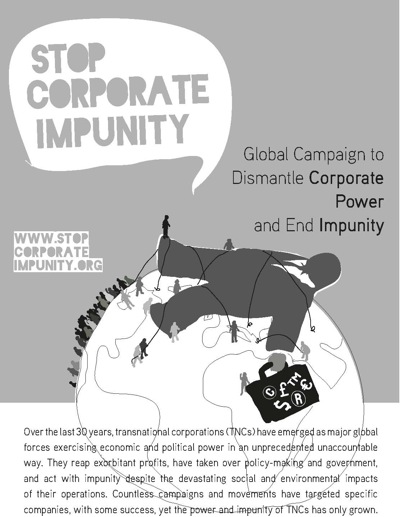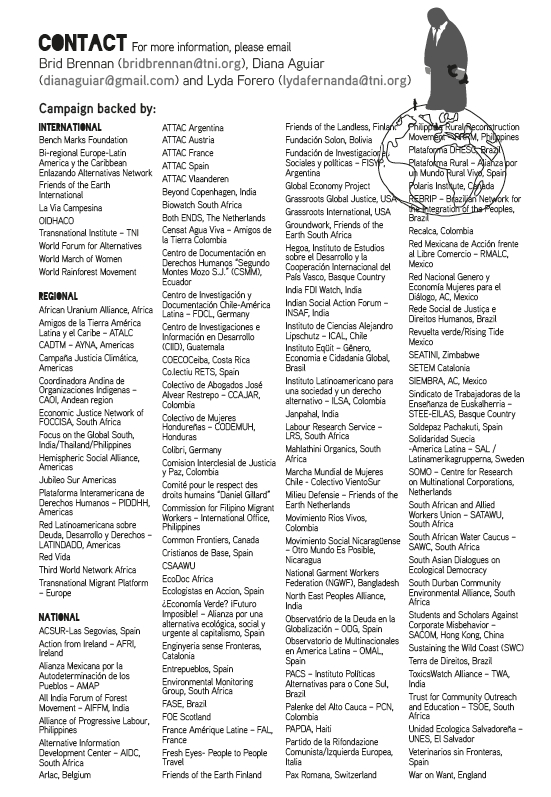Is it not time for a more systemic approach and campaign to dismantle TNC power, end corporate impunity, and put people and nature before profits?
Political Context
As the main agents of neoliberal globalisation, TNCs have sought to marginalise the regulatory role of the State, with the complicity of national elites, and create an “architecture of impunity” to shield them from accountability for the social and environmental impact of their actions. This architecture is composed of free trade and investment agreements, financial instruments and dispute-settlement mechanisms like ICSID which award investors more rights than citizens. At the same time, TNCs have sought to capture policy-making at both state and international level. Most elected and un-elected governments are dominated by corporate money and equate satiating TNC’s hunger for ever-more profit with national public interest. While multilateral institutions such as the IMF, WB, and WTO have long served corporate interests, institutions of the UN and the EU are increasingly being captured by TNCs. Yet despite, and indeed because of this, resistance to corporate abuse and greed is also on the rise.
Communities and movements around the world continue to confront corporations on the ground, as recent events in Peru, Mozambique, South Africa, Philippines, and Rio-Brazil (Vale, TKCSA, Petrobras) have clearly shown. Important work is being done to unmask the inherent flaws in Corporate Social Responsibility and voluntary mechanisms. Campaigns targeting specific TNCs or sectors are also growing in number and across borders. In order to effectively halt impunity and dismantle corporate power, it is vital that these initiatives join forces and converge.
Transnational corporations operate globally, moving from one country to the next, threatening states who dare to confront them with legal actions or withdrawal of investment. The Global Campaign to Dismantle Corporate Power and End Impunity aims to provide a global structural response to this unaccountable power: bringing together existing campaigns and networks to build collective, systemic responses to corporate power and advance peoples’ alternatives.
i. campaign goals and objectives
Long-term vision: Dismantling corporate power and ending impunity
• A collectively built International People’s Treaty on TNCS which will include an international legal framework and body that can impose binding obligations and sanction TNCs.
• Start process of dismantling TNCs’ political, economic and legal power, reclaiming public control over their operations, and holding politicians and corporate leaders responsible for corporations’ economic and ecological crimes.
• Strengthen the struggles of affected communities resisting corporate power and build a global movement against corporate power and impunity.
• Contribute to building an alternative economic and political paradigm rooted not in corporate power but in the dignity and well-being of people and nature.
Short to mid-term goals: Making the argument for legally binding mechanisms to ensure corporate accountability
1. Expose and denounce TNCs’ human rights violations and raise public awareness of corporations’ responsibilities for economic and ecological crimes.
2. Demonstrate the corporate capture of states and international institutions (e.g. ICSID, WTO, WB, FMI, OECD, UN) and the existence of an international architecture of impunity.
3. Develop and propose alternatives to TNCs’ monopolisation of political and economic power
4. Establish, at the global level, a debate on the need for a legal framework, binding obligations, legal codes and an international body and mechanisms to control and sanction TNCs in various jurisdictions.
ii. History of the campaign
This campaign initiative arose in the midst of the converging global crises and out of years of work of the Bi-regional Europe-Latin America and Caribbean Enlazando Alternativas Network and the Permanent People’s Tribunal to denounce European TNCs’ widespread human rights violations and ecological destruction in Latin America and the Caribbean. Between November 2011 and June 2012, a series of consultations were held at key moments of the political calendar (COP17, WSF in Porto Alegre, Americas Summit in Cartagena, FAME in Marseilles, meeting on corporate power in Johannesburg) to consult on the campaign proposal. In response to these efforts, in June 2012, over 100 organisations, networks and movements from Latin America, Africa, Asia, Europe, US and Canada signed on to a Call for International Action against TNCs (http://www.stopcorporateimpunity.org/?page_id=710) at the Rio+20 People’s Summit and launched the campaign.
Structure
At a strategy meeting in Rio de Janeiro in June 2012, in which over 50 people from 43 organisations and 23 countries participated, it was decided that the campaign would be developed through three working groups:
• Solidarity and Resistance: building links between corporate campaigns against corporations and developing more effective mechanisms to respond to corporate abuses
• International Peoples’ Treaty on TNCs: building a collective proposal from the bottom-up and undertaking advocacy work to present the Treaty to states and international bodies such as the UN, UNASUR, AU and the EU
• Global convergence-building, mobilisation and communication
Overall co-ordination will be facilitated by regular monthly coordination bilingual telephone calls open to all participating members in the campaign network; an email list and the campaign website: stopcorporateimpunity.org. It is also anticipated that regional focal organisations will have a coordination role.


